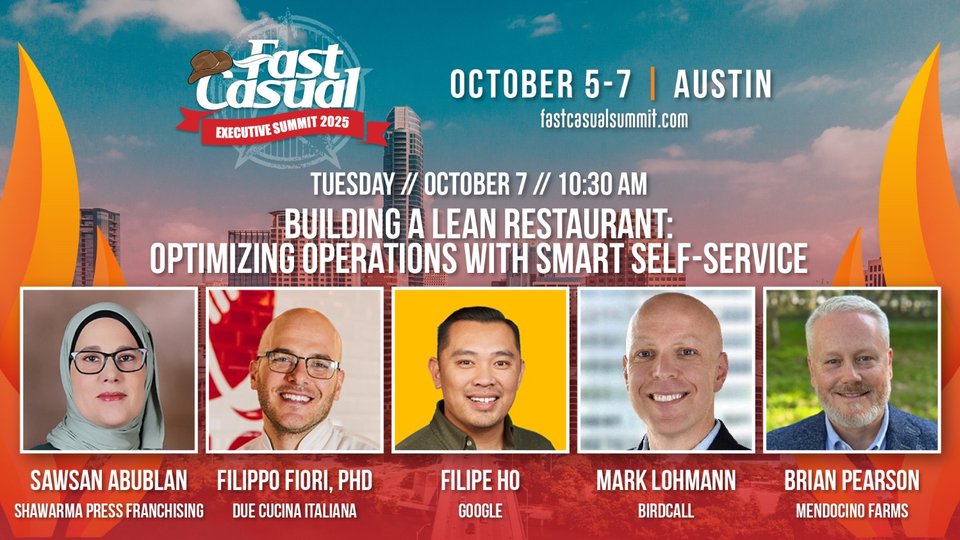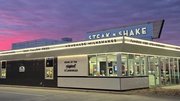Fast Casual Executive Summit
Lean, smart, scalable: Fast Casual Executive Summit panel explores the future of self-service
This panel will explore cost-effective self-service options, menu optimization, staff training and strategies for guest adoption, all with a focus on keeping operations lean.

September 9, 2025 by Sandra Carpenter — Editor, Networld Media Group
The fast casual industry has never faced more pressure to do more with less. Rising labor costs, evolving guest expectations and increasing competition are forcing operators to rethink how they run their businesses. For many, self-service technology is the answer, but the question remains: how can restaurants introduce these tools in a way that is both cost-effective and authentic to their brand?
That's exactly the challenge that will be tackled at the Fast Casual Executive Summit, Oct. 5-7 in Austin, during the panel Building a Lean Restaurant: Optimizing Operations with Smart Self-Service. This interactive session will bring together industry experts to share real-world insights on how to use technology to improve profitability, enhance efficiency and elevate the guest experience without breaking the budget.
One of the panelists is Filippo Fiori, co-founder and chief commercial officer of Due' Cucina, an Italian fast casual brand known for its streamlined operations and focus on delivering authentic flavors in a modern, approachable format. With years of experience growing a concept built on efficiency and guest satisfaction, Fiori brings a unique perspective on how restaurants can leverage technology while keeping hospitality at the heart of the experience.
In an email interview, Fiori offered a preview of the strategies and philosophies he will share on stage in Austin. His answers highlight three major themes: starting small, keeping the human touch and scaling through data-driven discipline.
Start small, scale smart
For operators who assume self-service requires a massive upfront investment, Fiori's advice is simple: start with the basics.
"Most small operators think of this as a huge tech investment, but even a single iPad with a reliable POS app can create consistency, speed and order accuracy without a big upfront cost," Fiori explained. Pairing that with a basic kitchen display system, he added, can make a dramatic difference in how smoothly the kitchen operates. "It ensures orders go straight to the line in real time, reducing errors and helping the kitchen run lean. And if the POS integrates cleanly with third-party ordering systems, you avoid the costly mistake of having staff re-enter orders or juggle tablets."
This approach, he said, is about setting the right foundation. Rather than chasing large, complicated systems, operators can focus on simple tools that improve order flow and reduce bottlenecks.
Technology that enhances hospitality
One of the biggest fears among operators is that self-service will make the dining experience feel less personal. Fiori believes the opposite can be true. When deployed correctly, kiosks and digital ordering free staff to focus on what really matters: guest connection.
"Self-service doesn't have to mean less personal. In fact, I've found it often frees up staff to engage more authentically with guests instead of being stuck behind a register," he said. At Due' Cucina, kiosks allow team members to spend more time in the dining area, guiding guests if needed but more importantly collecting feedback and building relationships.
Fiori also emphasized the role of design in maintaining brand voice. "You can design the digital flow so it still reflects your brand, one of voice, visuals, storytelling. Then the team adds the human layer: a welcome when guests walk in, delivering food with a smile, remembering regulars. Technology should do the repetitive work so people can do the meaningful work."
This balance — digital efficiency paired with human warmth — will be a key theme in the upcoming panel discussion.
Scaling through data, not gadgets
Finally, Fiori cautions against the temptation to constantly add new systems. The true path to scalability, he argues, lies in using the tools you already have to their fullest potential.
"I believe the biggest challenge is that many restaurants chase after the latest tech trends without first using the tools they already have to their full potential," he said. "You don't need five new systems. You need to maximize the value of the ones in place. That means really digging into the data you already capture: time to order, throughput, repeat order behavior. Once you understand those numbers, you can adjust labor, menu design, or workflows accordingly."
In other words, scaling is less about adding complexity and more about building discipline. "Scaling isn't about adding more complexity; it's about building a disciplined feedback loop that drives continuous improvement."
What attendees will learn
The Building a Lean Restaurant panel will offer operators practical, actionable takeaways, including:
- How to start small and scale effectively.
- Budget-friendly options such as POS systems with self-service features, low-cost online ordering platforms and existing tablets or mobile devices.
- Strategies to optimize the menu for self-service.
- How to train staff to support both technology and hospitality.
- Ways to leverage data to identify areas for improvement and cost optimization.
- Tactics to promote self-service and encourage guest adoption.
For leaders looking to future-proof their operations, this panel will provide both inspiration and real-world examples.
About the Fast Casual Executive Summit
Now in its 20th year, the Fast Casual Executive Summit has become the premier gathering place for top restaurant executives committed to innovation and growth. Each year, the event brings together the industry's brightest minds to explore emerging trends, tackle challenges and share strategies that shape the future of fast casual dining.
From Oct. 5-7 in Austin, attendees will engage in interactive sessions, connect with peers and hear from thought leaders like Filippo Fiori who are driving meaningful change in the industry.
As restaurants continue to navigate a rapidly shifting landscape, conversations like these are critical. By adopting a lean, disciplined approach to technology, operators can improve efficiency, preserve the guest experience, and position themselves for sustainable growth.
Register for Fast Casual Summit here
 ChatGPT
ChatGPT Grok
Grok Perplexity
Perplexity Claude
Claude












